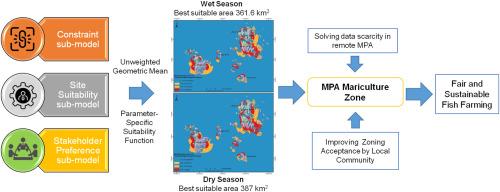利用利益相关者偏好的多标准评估,公平分配多用途海洋保护区中的小型有鳍鱼类海产养殖区
IF 4.8
2区 环境科学与生态学
Q1 OCEANOGRAPHY
引用次数: 0
摘要
海洋保护区内的海产养殖区主要根据成本效益/环境标准确定,很少考虑当地社区的偏好。本研究提出了一个基于地理信息系统的选址模型,以解决在设计海产养殖区以支持海洋保护区内小规模鳍鱼养殖户过程中的冲突问题。这项工作在阿南巴斯群岛海洋保护区进行,以代表印度尼西亚和其他发展中国家常见的小岛屿海洋保护区。采用了一个具有各种标准的三阶段选址模型(约束条件、选址适宜性和利益相关者偏好),并使用了一个具有非加权几何平均数的改良特定参数适宜性函数(PSSF)。利益相关者偏好用于平衡环境子模型的主导地位。使用限制子模型进行的第一阶段分析表明,在研究区域总面积(11,811.77 平方公里)中,只有 10.16% (1199.70 平方公里)被归类为可行的海产养殖区。随后的地点适宜性子模式确定,在旱季和雨季,分别只有 32.3%(387 平方公里)和 30.1%(361.6 平方公里)的可行区域被归类为最适宜有鳍海鱼养殖。在旱季和雨季,良好区域分别占可行区域总面积的 41.25%(494.9 平方公里)和 40.1%(481.65 平方公里)。利益相关者偏好子模型将 33.21 平方公里(2.77%)的可行区域划分为可分配给当地社区作为海产养殖区的最佳地点。选址模型成功纳入了多个选址参数,解决了数据可用性差的问题,并通过两种具体方法改善了海洋保护区海产养殖区的公平分配。几何平均数的性质阻碍了 MPA 特定区域(如核心区)内合适区域的分配。其次,利益相关者偏好由于纳入了当地养鱼户的偏好,提高了海产养殖区分配的公平性。建议的选址模型可用于在缺乏数据的海洋保护区环境中指定海产养殖区,并促进当地社区在海洋保护区内发展可持续的小规模有鳍鱼类海产养殖。本文章由计算机程序翻译,如有差异,请以英文原文为准。

Fair allocation of small-scale finfish mariculture zones in multi-use MPAs using multi criteria evaluation with stakeholder preferences
Mariculture zones in MPAs are primarily determined based on cost-effective/environmental criteria and rarely incorporate local community preferences. This study proposed a GIS-based site selection model to solve the conflicting issues in designing mariculture zones to support small-scale finfish farmers in MPAs. The work was undertaken in the Anambas Archipelago MPA to represent a commonly populated small-island MPA in Indonesia and other developing countries. A three-stage site selection model (constraint, site suitability, and stakeholder preference) with various criteria was employed using a modified parameter-specific suitability function (PSSF) with a non-weighted geometric mean. The stakeholder preference was used to counterbalance the dominance of environmental sub-models. The first stage analysis using the constraint sub-model determined that only 10.16% (1199.70 km2) of the total extent of the study area (11,811.77 km2) was categorized as feasible for finfish mariculture. The subsequent site suitability sub-model determined that only 32.3% (387 km2) and 30.1% (361.6 km2) of the feasible areas were classed best for finfish mariculture in dry and wet seasons, respectively. Areas classified as good covered 41.25% (494.9 km2) and 40.1% (481.65 km2) of the total feasible areas in the dry and wet seasons, respectively. The stakeholder preference sub-model had classified 33.21 km2 (2.77%) of the feasible area as the best sites that could be allocated as mariculture zones for the local community. The site selection model successfully incorporates multiple site selection parameters, addresses poor data availability and improves fair allocation of mariculture zone in the MPA via two specific approaches. The nature of the geometric mean prevents the allocation of suitable areas in the MPA-specific zones, such as core zones. Second, the stakeholder preference improves the fairness of the mariculture zone allocation due to the incorporation of local fish farmers' preferences. The proposed site selection model could be used to designate mariculture zones in a data-poor MPA environment and facilitate local communities in developing sustainable small-scale finfish mariculture in MPAs.
求助全文
通过发布文献求助,成功后即可免费获取论文全文。
去求助
来源期刊

Ocean & Coastal Management
环境科学-海洋学
CiteScore
8.50
自引率
15.20%
发文量
321
审稿时长
60 days
期刊介绍:
Ocean & Coastal Management is the leading international journal dedicated to the study of all aspects of ocean and coastal management from the global to local levels.
We publish rigorously peer-reviewed manuscripts from all disciplines, and inter-/trans-disciplinary and co-designed research, but all submissions must make clear the relevance to management and/or governance issues relevant to the sustainable development and conservation of oceans and coasts.
Comparative studies (from sub-national to trans-national cases, and other management / policy arenas) are encouraged, as are studies that critically assess current management practices and governance approaches. Submissions involving robust analysis, development of theory, and improvement of management practice are especially welcome.
 求助内容:
求助内容: 应助结果提醒方式:
应助结果提醒方式:


